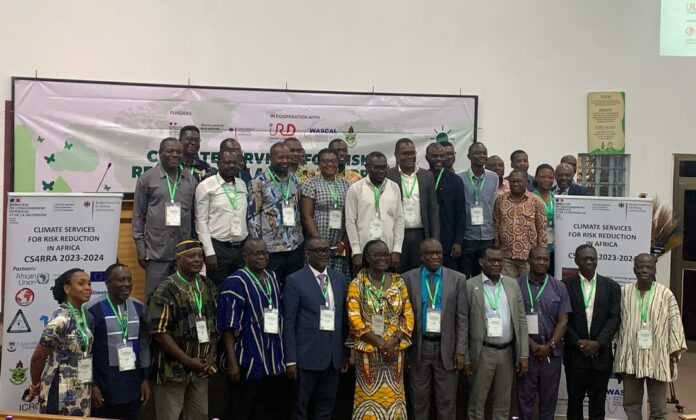The Climate Services for Risk Reduction in Africa (CS4RRA) 2023-2024 WEBINAR forum in West Africa has been held with a call on all stakeholders to develop effective strategies to meet the challenges of climate change and land use change in the sub-region.
This forms part of efforts to provide a comprehensive understanding of the issues, solutions and needs related to climate-smart agriculture and sustainable land use management in West Africa.
During the opening ceremony of the Ghanaian session as part of the four West African countries for the Hybrid Webinar on the theme “CLIMATE-SMART AGRICULTURE AND SUSTAINABLE LANDSCAPES”, Vice Chancellor of the Kwame Nkrumah University of Science and Technology, Prof. Rita Akosua Dickson bemoaned the effects of climate change on the continent.

“Africa, our beloved continent with an incredible agricultural potential is one of the regions which is most vulnerable to the adverse effects of climate change. Long drought, erratic rainfall patterns and increased frequency and intensity of extreme weather events impact farmers, communities and ecosystems across Africa,” she lamented.
She underscored the relevance of the webinar saying, “the question is how do we look deeper to find solutions in the face of these adversities? It is therefore a privilege to be part of this webinar to listen to experts speak on important topics such as climate smart agriculture, sustainable soil management among other holistic approaches to combat the global phenomenon.”

Executive Director of West African Science Service Centre on Climate Change and Adapted Land Use (WASCAL), Prof. Emmanuel Wendsongre Ramde acknowledged the challenges ahead and called for a collective approach in fighting climate change.
“As we reflect on the valuable discussions and outcomes achieved, I am very optimistic that the knowledge shared and partnerships built will translate into actionable plans and initiatives to strengthen climate services for resilient agriculture, and particularly in the areas of agriculture.
To the important stakeholders of water management, early warning and disaster risk reduction, the challenges we face are immense. Based on working together, we can turn these challenges into opportunities for innovation and progress,” he said.
He implored participants to leverage strategic efforts and research in fighting the menace.
“Let us seize this moment to accelerate a strategic stakeholder engagement framework that will drive sustainability blocking and resilience building efforts across the region.
Together, we have the power to make a lasting impact on the lives of millions of people in Western Africa, ensuring they have access to timely and accurate climate information to enhance agricultural productivity and build resilience to climate change and let us continue to work with climate services, empower communities, and transform.
“I will call on us all to join hands together to strengthen partnerships for climate resilience agriculture, holding alliances that amplify our impacts. It is crucial to implement actionable plans. Enhancing climate services, turning discussions into tangible results, leveraging diverse expertise to drive meaningful change.
Indeed, we must walk the talk by empowering communities with timely climate information, ensuring they have the tools to adapt and succeed. Let’s all come together to build resilience and promote sustainable development across West Africa and beyond, committed to a future where every individual can grow. Together we can make a lasting impact”, he expressed optimism.
This webinar covered a range of topics to address the complex challenges and opportunities including; Climate change, land degradation and sustainable resource management at different scales by Ndeye Fatou Mar (Head of Dept. Land and Biodiversity, Sahel and Sahara Observatory) from Tunisia, Climate Smart Small Ruminants Production System for Food Security and Climate Resilience in West Africa by Prof. Ahmed A. Balogun (Dept. of Meteorology & Climate Science, School of Earth & Mineral Sciences, Federal University of Technology) from Nigeria,
The rest are; Climate-smart and sustainable soil management in the Anthropocene: A holistic approach by Prof. Vincent Logah (Department of Crop & Soll Sciences, Faculty of Agriculture, KNUST) from Ghana among others.
Story by Zakariah Issah/Akoma FM/3news.com













